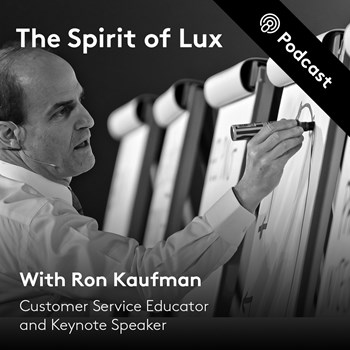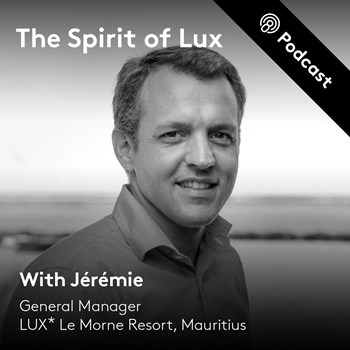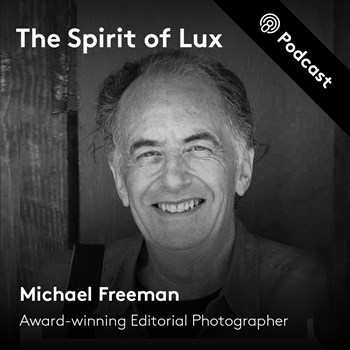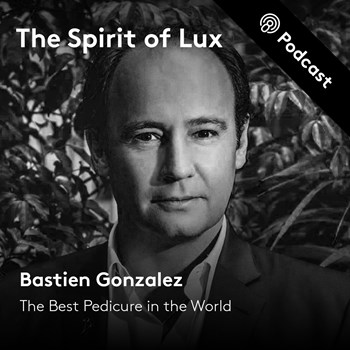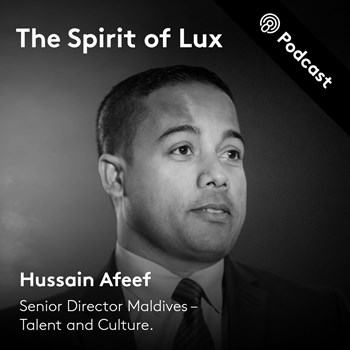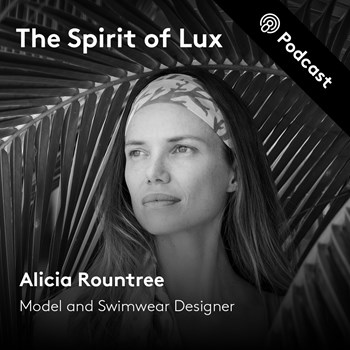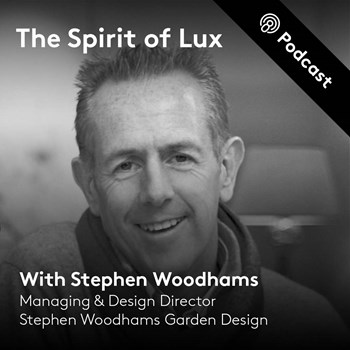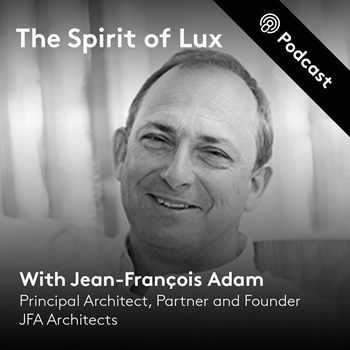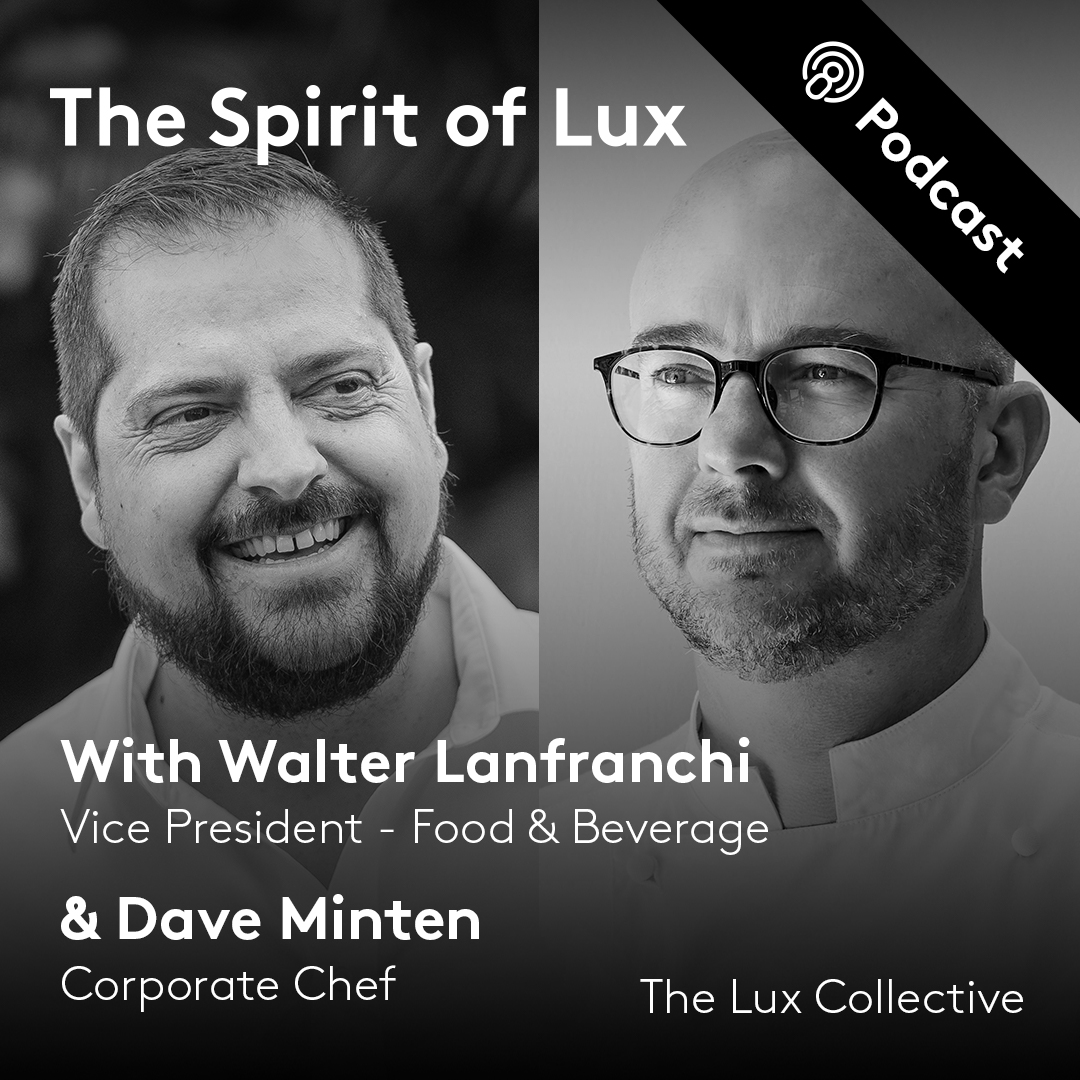 The invitees on the fourth episode of our travel podcast are two of LUX* Resorts & Hotels’ most loved culinarians, chefs Dave Minten and Walter Lanfranchi. From travelling the world in search of inspiration, to research and development in a test kitchen, from concept to real life, these two take us behind the scenes of LUX*, a hospitality brand known for its creative conceptual restaurants and dining.
The invitees on the fourth episode of our travel podcast are two of LUX* Resorts & Hotels’ most loved culinarians, chefs Dave Minten and Walter Lanfranchi. From travelling the world in search of inspiration, to research and development in a test kitchen, from concept to real life, these two take us behind the scenes of LUX*, a hospitality brand known for its creative conceptual restaurants and dining.
Culinary excellence with Dave Minten and Walter Lanfranchi
Paul Jones: I’m Paul Jones and you’re listening to the Spirit of Lux.
Dave Minten: Flavor is the most important. The true flavor of product, that's what counts for me.
Walter Lanfranchi: In terms of food and beverage, in terms of chefs and mixologists, it is a great moment for all of us, because there is so much creativity out there and the access to product is so easy at the moment.
Walter Lanfranchi: I think what Grand Baie is a combination of all our knowledge, mine, Dave, and yours, Paul, all our passion basically put in one single hotel. It is amazing.
Dave Minten: The world is endless and we will never ever be finished learning because around every corner, there is something new. And that's the beauty.
Paul Jones: Welcome to another episode of the Spirit of Lux. Today I'm excited to have two of the world's most talented chefs and LUX*'s celebrated culinarians on the podcast, Chef Dave Minten and Chef Walter Lanfranchi. Chef Dave specializes in French and Mediterranean cuisine with a focus on working with fresh produce. Walter worked very closely with the management as well as the research and development team to conceive and develop new food and beverage concepts for the group. There's a lot to cover in this episode. The extraordinary world of LUX*'s gastronomy that encompasses all five senses and how they are bringing the The Lux Collective to greater heights through the test kitchen concept. The chefs also take us behind the scenes of the upcoming LUX* Grand Baie offering laid back dining from morning to night at Beach Rouge, the eye-catching and exotic Ai Kisu Restaurant, which will offer best in class contemporary Asian cuisine, as well as the wonderful rooftop Bisou with the views over the lagoon, and the wonderful sunset, and of course, not forgetting Maison LUX* combining the best of French and Italian inspired cafes and bars, offering fresh home brewed coffee, as well as delicious pastries and chocolates and liquors and aperitifs. Maison LUX* promises to be the wonderful experience in the vaulted lobby as you enter the hotel with magnificent views over the Turquoise Lagoon of Grand Baie.
Paul Jones: Greetings! Today we are joined by two of the finest chefs in the world. We have with us Chef Walter, who is of Italian extraction, and we have Chef Dave, and both of them live in Mauritius. Now Chef Dave and Chef Walter, when I was at school, I was 15 years old, then the Careers Master said to me, "Jones, what do you want to do when you leave school?" I said, "Well, sir, I want to be a chef sir." He said, "A chef? What do you mean you want to be a cook?" I said, "Yes, sir." "Why do you want to be a cook?" I said, "Because in the scouts, I do cooking and I like it, sir." He said, "Jones, you should have more ambition." I said, "What do you mean, sir?" He said, "You should want to be a hotel manager." I said, "What's that, sir? I want to be a chef." He said, "No, Jones. You must be a hotel manager." So, I think from those days, which are in the 60s, so it's a long time ago, the image of chef has certainly changed. So, tell us Chef Walter, how did you come to become a chef?
Walter Lanfranchi: Well, Paul, I think everything started with my mother and my sister. They were both you know and they still are great cooks. While my mother was cooking, I always go there and see what she was doing, try to learn some of her tricks. And then when she was not in the kitchen, I was going in and try to practice, try to copy what she was doing. And my sister, probably with the right training, she's probably better than me actually in terms of cooking. So, I learned so much from her. And also, she had a bar when I was about 13 or 14, I remember that I used to go there and I'm making sandwiches, learning to make sandwiches, making French fries. And for me, it was an opportunity to kind of be out of the house, be around people, the older people so I felt somehow older as well. And from there, I started to basically like the world of cooking. It fit very well with me.
Paul Jones: And where were you in Italy at the time, Walter?
Walter Lanfranchi: Bergamo is a small town just north of Milan.
Paul Jones: So, north of Milan, that means you use a lot of butter rather than a lot of oil.
Walter Lanfranchi: Indeed. And there is a lot of mountains around where we are, it's cold. So yes, we use meat, butter, cheese. It was very much a staple in our cuisine and it's still. Thankfully now, the younger generation, they're kind of moving away from it.
Paul Jones: Wonderful. Chef Dave, share with us your journey.
Dave Minten: For sure. I was, I think like many chefs, not the best student. My grades were absolutely crap at the sea. I had to learn it for a profession, so it was the question, ‘what?’. I like cooking indeed, as Walter said, also helping my grandmother who was living in our house. And what my father decided, he basically got me a job in the local restaurant for a few weekends. And the other interest that I had was bakery/pastry. So, we also went to the local bakery and pastry and I worked there a few weeks to make up my mind a bit. Pastry and bakery, that was too sweet and too messy. So, it became evident that was cooking. And from there, I went to culinary school. And from day one, my studies weren't actually very, very well, given that even my mother was also making buffets or caterings for people. I started to help her, and that even resulted in the fact that we built a kitchen, we even have a walk-in kitchen at our home, where we make cold buffets and catering for parties, etc.
Paul Jones: So, tell me, Chef Dave, when you were in culinary school, did you have the same experiences I did when I was at a hotel school, where the culinary teacher told me, "There's only one book. It's cofie. And if you want, there's another one called [foreign speech]" In other words, very French, very old-fashioned cuisine. Was that your experience?
Dave Minten: Yes, correct. [foreign speech] obviously is the culinary Bible. We had a version of that called Polly that came from Switzerland was a very thick one as well. And it was all very clear and it was really, really nicely explained, and we went all to the product knowledge that said try it, it was old school. I remember when I went to the culinary school first, Mr. Yonson, I'd never forget he was the general manager at the school, the director, and we went to in his office, he said to me, "So, you want to become a chef," as you experienced, Paul, as well and he gave me all the bad things about it. You have to work on Christmas and you are never at home and this and that. Then he went on for 30 minutes onto me. I was a boy, I was 15 years old. And after when he was finished, he said, "Do you still want to be a chef?" I said, "Yes, Mr. Yonson, I still want to come," and I went.
Paul Jones: That's fantastic. So, Chef Walter, what brought you to Mauritius?
Walter Lanfranchi: I worked for another company for 10 years, interrupt your connection, you know, some of the guys that I used to work with. I basically had an opportunity to join Naiade back in the days that LUX* was called and I was tired of the corporate world you know. If you want to change something, it has always been hard to change anything. But then when I joined Naiade, I realized that the company was going to change, was going through an evolution. It actually was a great fit for me because I was looking for a company that was giving me the freedom to a certain point to decide what to prepare, what to cook. Whereas sometimes in other company, they're a bit more strict, and the corporate guys, they come in and they tell you exactly what you have to cook and what you don't have to cook. So, I think change from a deck company to Naiade was actually a great thing for me.
Paul Jones: And Naiade became LUX*, of course, Walter, and you were one of the pioneers of that rebranding of Naiade into LUX*. What was the big difference for you in that time about 11 years ago?
Walter Lanfranchi: Well, if I have to be honest, when I arrive and it was still Naiade, I actually thought to myself, "Did I make a mistake leaving the other company?" But then once I met you and once the plan in order to change into LUX* came into light, there was playing, and then realize that okay, this is the company that we need. Working with you, learning, still we are learning, you are inspiring all of us and not because we are just talking at the moment, but you are a true inspiration. So, I think all of us at the moment that we are in LUX*, I believe the reason is because we had an opportunity to work with you. I think that's what it is.
Paul Jones: Oh, that's very kind of you. And Chef Dave, how did you get to Mauritius?
Dave Minten: Actually, in 2011, I was interviewed by Dominique Rue for LUX* South Ari. And that time, I let him down, I didn't come, I actually went to Seychelles to work for a corporate company. And maybe it had to be like this, because in 2016, LUX* called me back and I joined in all this at that time. Also, that was tough negotiations. It was great. The corporate world, as Walter also just said, I think our company is about play. We have fun in F&B, we have fun in the company. Paul, you inspire the team constantly, you send those emails, you send those ideas, Walter does the same. We're sending each other constant feedback in terms of what is out there. And since 2016, really, I enjoyed every single moment. And it was '19, I left the Maldives and I came to Mauritius, to begin in my current position.
Paul Jones: Oh, fantastic. And what would you say is the major difference between Maldives and Mauritius, Chef Dave?
Dave Minten: That's a difficult question. Mauritius is a bit more, in terms of hotel and F&B, is a bit more authentic. From a working point of view, 95% with your local people. While Maldives, it is 95% with, especially in the kitchen, with experts. That's a bit different. I think in terms of sourcing product, Mauritius is a bit more difficult as well. We can get what we want, but it is a bit more complicated than Maldives. And Maldives, I always said, "Whatever you want, our suppliers are all over the world. We can get whatever we want from every place in the world that we want." I mean, Dubai, Europe, France, Australia, China, Melbourne, Australia, it all flies in on every flight what comes in, and that made it easy in Maldives, to be really honest, to work.
Paul Jones: Fantastic. And how do you both of you work together? Chef Walter, how do you interact with Chef Dave? And what do you do? How do each of you function?
Walter Lanfranchi: I think somehow we work pretty well together. We work both in F&B but we have some kind of clear distinction, probably something that we decided in a way. In terms of project, when there is a new concept to be developed, at the beginning, I'm more involved into that, of course, with the help of Dave. Once we're getting closer into the opening of these projects, Dave's coming to the place more and more. Once it's open, Dave basically takeover the culinary part and I keep going into the beverage element. But apart from that, honestly, we are bouncing ideas. Every day, we are sending each other Instagram screenshots or we are looking at books, we are looking some ideas. I think we work very well together because it's a constant flow of ideas. Sometimes, you Paul, tell us, "Okay, that's what I would like to do or to wear." And both of us straight away, we get into this brainstorming mood. And I think that's why we work well together. We both want something different. We want to create something that is unique and is not available for sure in Mauritius and in Indian ocean. And we work for it. We do our best to really make it happen. And so, I think that's why I work very well with Dave.
Paul Jones: Fantastic. And Chef Dave, what for you is the importance of taste and flavor? How does that come into the whole mix of things?
Dave Minten: Taste and flavor is everything. We went over the years, over the last let's say two decades, a lot of happened in the culinary worldwide. We had monocular cuisine where chefs were changing certain structures of certain ingredients. I think we're back to basics at the moment in that regard. And flavor is what it means to be. Flavor is the most important. The true flavor of product, that's what counts for me. We have learned a lot from the last two decades, we have learned a lot from the great chefs like El Bulli, and we're still using techniques these days. But I think the flavor is the thing. The flavor of the product that we can source, what is unique to regions. Okay, we live in islands, so we import also, but definitely flavor is everything that counts. And with that regards, we need to stay authentic to the flavor and also flavor when it comes to dishes from certain regions. I was reading an article this week about authenticity, and one of the chefs said, "There is no authenticity on a dish because if a dish comes from another village, it is the same dish, but it comes from three villages away. It is different." In a way, he is right, but it is still authentic to that village, and that every chef brings in his own flavor, he brings his own pattern and working with the chefs that we do all over the world, and especially in all the countries that we are, it's just amazing what we learn and what we have in our hands. So, that's flavor for me. It comes down to the product, it comes down to the region, and it comes down to what the chef can do with the product.
Paul Jones: Fabulous. Chef Dave and Chef Walter, apart from your immediate family members who obviously were a great influence on your early career, who for you today are the major influences in the culinary world that make an impact with each of you?
Walter Lanfranchi: Something that I liked a lot when I visit Noma in Denmark, they are really at the forefront of, of the cuisine, they are pushing the boundaries. And they did it for many years, but they still doing it. Similar to when El Bulli and Ferran Adria started, I think I prefer where we are at the moment with a Noma kind of concept, because they are really down to the ingredients. And to the season, I think they are respecting the season, which is something that, unfortunately, with all these importing, we forgot about it. It's so easy for us to bring in anything from around the world. But I think we are going back to the season. And really appreciating the ingredients. I had a chef in [inaudible] back in Paris, for him the quality of the ingredients will was everything. There was no compromise. Even a simple fruit salad, he had his own way to cut, his own way to source is the fruits and everything. So, a simple thing like a fruit salad, it could be done to perfection. And what Noma does is really pushing these boundaries in terms of the fermentation. And it's something that Dave and I are learning to do. Dave loves different types of kombucha and it's something that we're going to do as well in LUX* Grand Baie, but it's something that we are introducing a bit everywhere. So, yeah, I think there are a lot of great chefs. I think in terms of food and beverage, in terms of chefs and mixologists, it is a great moment for all of us, because there is so much creativity out there and the access to product is so easy at the moment. Dave, I don't know, what do you think?
Dave Minten: Absolutely. There's a lot of great chefs out there. I had a lot of people who driven me and those of you, Paul and Walter, drive me every day, but also my teachers in the past who have driven, the flavor was driven me what I probably am today. I worked for six years at a Michelin star restaurant. I work with a great chef in the Netherlands who held for 31 years a Michelin star. And next to that, it was also a very big hotel with a banqueting facility but they still kept the star. And this chef, he was rigid on every single thing. That is still what I hold today in my DNA. Four years with him has definitely brought me what I am. He was also on to product, he worked with local very small suppliers. And that's it, people in my career have pushed me. I've worked with great gems, have worked with easy gems, but I also have worked with gems who really, really pushed me hard and that has brought me where I am today, I believe and that is also the passion that we have, indeed, reading, constantly looking for new product, constantly looking for new dishes and what is out there. The world is endless and we will never ever be finished learning because around every corner, there is something new. And that's the beauty.
Paul Jones: So, Chef Dave, tell us about your normal day in LUX*. What are you doing around the world? What's happening in LUX*?
Dave Minten: Of course. Well, until 2019, I was obviously the executive chef for LUX* South Ari. So, there you are much more in the kitchen, and busy with the teams. But since I became corporate chef-- I'm looking very forward by the way to go back to LUX* Grand Baie for a while to open it up and to go back full-time into the kitchen-- what I'm doing, I mean, together with Walter, we're developing concepts. We are helping the chefs in our resorts with their daily tasks. That can be all kinds of things. We have recently developed a few new concepts. One is called Keen on Green, one called Little Travelers for LUX*, it's our new kids menu program. Definitely working on with, obviously, the development team, the design team. In LUX* Grand Baie, we have worked on for the last two years or three years on the design. Since the build has been started one and a half year ago, we obviously start working on the menus, on the concepts that need to crystallize in our head, sourcing chefs, we do in recruiting, and then various other projects around the world where we involved in the daily meetings, as Walter said, of course, that is a bit more at the start on his side, but he keeps me always well-informed, we’re bouncing back ideas. And so yeah, it is a constant flow. We have our other brand SALT; we visit the hotels regularly. We wrote a book; it is behind Walter on the shelf there. So, yeah, that's what keeps us busy I think every day.
Paul Jones: You're a very busy man, Chef Dave. Chef Walter, tell us about how you spend your time with LUX*?
Walter Lanfranchi: Well, thankfully, I had the opportunity to travel and be part of a lot of new exciting projects. At the end, that's one of the major things that I do in LUX*-- going around the world, working with architects, with designers, with very creative people, and coming up with unique products. I think that's something that I do on a day-to-day basis. But I think one thing that I like to do is create opportunities for the team. And I think we both do, Dave and I, and actually all of us at LUX*, we are creating opportunities to give to our team members, to grow. We are there to inspire them, we are there to share our knowledge, whatever small or big it might be. But I think that is one of the big parts of my job or our job in F&B. We have the opportunity and the luck to travel around the world and see new things. So, for us it's only fair that once we are back on the island, it's to share with everybody, and that's something they give us a lot of pleasure to do.
Paul Jones: Wonderful. Chef Dave, one of the most striking things that you did in 2016 when you launched the new South Ari Atoll in Maldives was homemade.
Dave Minten: Correct, yes.
Paul Jones: What is homemade?
Dave Minten: What is homemade? A lot of hotels, a lot of chefs, we used to buy things from outside-- as simple thing as yogurts-- that we buy from suppliers. We fly everything in. A little of yogurt, fly that in from Dubai has a big cost, while yogurt is actually just milk that has been fermented. So, it started off with this kind of things. Homemade for me as well is teach again our chefs. As Walter just said, teach our chefs, be with our chefs. What is authentic cooking? There are not many chefs anymore who make their own [foreign speech] or make their own glasses. It's all available with suppliers that is full of additives. And we bring in bones. We ask our meat supplier to ship beef bones to our locations and we make stocks. We make yogurts, kombucha-- we started with that. Jams, yeah, jam is definitely available everywhere but we make up our own jams. We buy the fruits, especially here in Mauritius, that's great, because there's lots of fruits in season available so that we can use. So, we really inspire the team to go back and to make your own stuff. In LUX* Grand Baie, we will not have any pasta coming in from outside, we're going to make every single pasta ourselves. And that's what homemade is about, going back to home cooking and really explore whatever we can. We brought in tiger nuts in Maldives and we make our own horchata. Horchata is a drink that is coming from Spain, good for digestive health, good for your body. So, a lot of things the fermentation comes in. We studied a lot about it. In LUX* Grand Baie-- we'll come back to that later-- but we have the lab where it's going to bubble, it's going to ferment, a lot of things going to happen, things are going to explode, for sure, one day. But I think that's the fun-- teaching the get the guests, but definitely also the guests bringing them into this process of homemade and guests appreciate that. We have a little label for it, you can see it in our menus, in hotels, where we have buffets, you see it back in the buffets. And I think it adds a touch that guests will see that we really go the extra mile to make something special for them.
Paul Jones: And Keen on Green, that's another signature element of the food offering.
Dave Minten: Correct. Yes, Keen on Green, we have seen around the world and in our companies, Walter at some point, I believe you still, Paul, are vegan, and a lot of people became vegan, or vegetarian over the years more and more out of many reasons. It could be balancing your own body and mind; it could be as well taking care of the planet. We all know that the food industry is destroying the planet at the end of day. And as a company, we felt that we need to bring this to the next level. And we went looking with the team, what can we do to bring this up, and we took the step to say, okay, 35% of our menus in our hotels or restaurants going to be Keen on Green, and we develop the logo for it, we develop a menu layout for it, where it's very obvious to the guest, all the dishes are printed in green. We've developed a story about it. So, 35% of every single menu, everything in buffet is Keen on Green-- either vegetarian or vegan. So, obviously the 35% split in those. And we feel as a company, it's very important that we bring our part to once again balanced mind and body as well as to the world problems that we have in terms of environmental. So, that's Keen on Green in a nutshell.
Paul Jones: How about taste?
Dave Minten: It's a bit the challenge because we work with chefs around and I am not the youngest chef anymore either. When you ask a chef, "Make me a vegetarian dish." "Oh yeah, Chef, no problem. Here is a tomato mozzarella, or here is a pasta arrabbiata." That was 10 years ago, 20 years ago, and that was as far as vegetarian and vegan would go. And if it would be very special, it would be a truffle pasta with some fresh truffle salsa. That is not what we want. We need the chefs to investigate. We are investigating and there are some great people around in, again, Instagram, but also people who have really brought vegan or vegetarian food to the next level where we need to learn from. But it needs to be great food with great flavors, work with spices, work with products. Our pastry chef, Chef Marie, she turned the sweet potato into a dessert by caramelizing it and bring it up with citrus fruit. And that is the type of spirit Keen on Green needs to be. Of course a tomato mozzarella is good and green, but it needs to be much, much more than that and the flavors need to balance out. And the beauty is that we have all these experiences due to our travels. So, we can bring in spices from Asia into our dishes. We can combine-- we are in the Indian Ocean at the end of the day, a great nation, India and Mauritius is very famous for their vegetarian food and they have some great dishes. So, that using in our hotels is what Keen on green is all about.
Paul Jones: Fantastic. Chef Walter, we've heard a lot about the LUX* Grand Baie project. Please introduce this project to us. What have you been doing? What are the secrets of LUX* Grand Baie? What's going to be so special about this brand-new property that is being developed on the north coast of Mauritius in the picturesque village of Grand Baie?
Walter Lanfranchi: Well, the first thing that we did was to ensure that the property and the restaurant, they're accessible to everybody in a way that you don't have to make a booking, you don't have to know somebody to get into the hotel. This hotel, like anywhere else in the world, people can just walk in and have a coffee, have a drink or have a meal. So, I think that was one of the first thing that we wanted to do and we achieve it. We took our concept to a completely different level. If we think about the beetroot, we basically break it down took the manual, we threw it away, we rewritten the whole manual, we built something that is completely new to Mauritian to the Indian Ocean. I think if you can compare it, it's something could be in Mykonos or Ibiza or Tulum, that kind of vibe. We decided to basically cancel the world buffet. Basically it's gone. Nobody is allowed to use the world buffet and the word all-day dining is another one that is gone from anybody. We will serve breakfast, lunch, and dinner, ala carte, of course, Dave designed all the menus. All the menu they are changing daily. And this is something truly unique as well. Something not easy, something that Dave is working out on it. We have indoor and outdoor space, beautiful bars, we have three bars, we have two swimming pools, DJ area. So, it is a party place but it's a place also for families to go. There was something also that we want to keep in mind. We want to have areas with different kinds of energy for party, to relax, and for birthday parties, have special dinner with your wife, with your girlfriend. Every year is designed to ensure that we will be able to cater for all our guests. As such, we have Beach Rouge, then we have Ai Kiso. Every time I look at the picture, every time I look at it, it's something so special. The experience that we will be able to create both in food and beverage, they are out of this world.
Walter Lanfranchi: Honestly, for me, it needs to be one of the best restaurants in the world. Because what we have there, what you give us to work with is something truly, truly special. It's focused on contemporary Asian cuisine-- very moody, very dark canvas space. But at the same time, using texture and different material brought up a lot of kind of reflection starting from the ceiling to the reflecting pond, to these huge fire pit outside. We have as well the club. So, if somebody wants to continue the evening, they can just basically pop over. Until two o'clock in the morning, there is music playing. And if somebody wants a place a bit more relaxed, a bit more private, we have the rooftop bar and restaurant. You just go up there is open only for adults until 6:30 then we will allow as well as teenagers. Normally, it's open only for hotel guests. And that's basically you will oversee this beautiful lagoon of Grand Baie. It is the best place to be in Grand Baie, without a doubt. There is no other area that you can compare to it. We have this big infinity pool. We have a table in the pool where our guests can actually sit and have lunch, dinner, and wine or breakfast, if they wish to. Dave designed our amazing manual based on tapas from around the world, focused on Southeast Asia, South America and a bit of European touch. And then Maison LUX*, it's our new jewel located in the lobby. We took inspiration from cafe out of Milan or in Paris, where we will serve coffee, ice cream during the day, pastries like Pasticceria out of Milan or beautiful eclair shop back in Paris. And when they even in come, the bartender and the barista, basically will swap place. So, the barista will take over and the authority was coming into place all the way to after dinner with a different kind of Amaris or cognac and so on. So, there is actually something for everybody. I'm sure I forgot about something. And I'm sure Dave wants to share a bit. But I think what Grand Baie is a combination of all our knowledge, mine, Dave, and your, Paul, all our passion basically put in one single hotel. It is amazing.
Paul Jones: Unbelievable. Unbelievable. So, Chef Dave, what's cooking at LUX* Grand Baie?
Dave Minten: Oh, a lot. Where to start? I mean, there's a lot of great experiences. First of all, Paul, you came up a few weeks ago with the idea to have daily changing menus. And that brought us into, okay, how are we going to do that. So, that's one, we have daily changing menus.
Paul Jones: Did that cause you to lose your hair?
Dave Minten: No. I lost them a long time ago. [laughter] Yeah, so definitely, it was a challenge, we're going to make it happen. We have daily changing menus at Beach Rouge. We're going to bring back an old-fashioned one, the trolley. And that came from one of your ideas, you wanted a trolley in Maison LUX* that has a [inaudible] trolley. And we bring it back in most areas, again, in our service. So, in Beach Rouge, we have for breakfast, daily changing, pass around dish on the trolley in the morning. In the afternoon, we have designed four unique dishes that we will start over and more will come for sure that the guests can order with preparation on the table that can be a potato on coat fermented and pickled vegetables and nice mustard. They can be like four different marinated settlements that come to the table and we serve them with a nice balsamic ice cream. We're going to have fresh tartare on the table, where we grind the beef in front of you on the table and we make a fresh tartare with a nice runny egg yolk. We bring a trolley into-- Walter came up with this idea, we're going to make it happen-- we're going to have the [foreign speech] the French one, but we're going to turn it into [foreign speech] Peking duck one. So, that's the fun that we have with each other. And I think that that's just brilliant. So, they can add other prizes there and I'm brainstorming already with a Chef de Cuisine who's going to join us soon in August. Was currently in Hokkaido in Japan, "How are we going to do this?" The soya sauce sommelier. We don't want to offer the guests one regular soya sauce, we want to have 10-12 soya sources from different flavors, from different saltiness, barrel aged, authentic items that the guest has chosen from. There's so much to talk about. I mean, we're working on the menus tirelessly to come up with new things. One thing that we're going to have in Ai Kisu is, we have a beautiful show plate, and on the show plate, we wanted to do something with it as only a show plate. So, we're going to come up with a concept we call it for now in the working environment still, we still working it all out, the fortune cookie, where we bring the guest a fortune cookie with a fortune inside, and that can be small experiences in the resort or that's happening on the table that night in Ai Kisu. Maybe once a year, you'll have maybe a free stay in there. You'll never know. So, that's what we're doing.
Paul Jones: Wow! Unbelievable. They told me that the cooking in Ai Kisu is with flames. How is that happening?
Dave Minten: Correct. Absolutely. Yes. We have the warayaki cooking. Warayaki cooking is a big flame. It's originally done in Japan with rice straw. But we obviously have abundance of sugarcane straw here in Mauritius. And actually, in my doorstep, there are still two bags of sugarcane straw standing, I need to go to the field and light it up to do some testing. But we picked it up like a few weeks ago from the sugarcane factory and it's going to work. So, we're going to have a big flame where we roast or sear a beautiful piece of tuna or a nice piece of seafood. Even meat can be done. It still will be raw on the inside, though it's still a sashimi style type of cuisine, and it's going to be marinated with all kinds of pre marinated or topped up with all kinds of flavors and sauces or just as sashimi. So, that's the warayaki. And it happens in front of the guests. We estimated that will happen like 15 to 20 times per hour. So, basically the flame is on and it's a one-and-a-half-meter flame. So, not to be missed.
Paul Jones: This is theater.
Dave Minten: Absolutely. :
Paul Jones: This is incredible. Wow. And your chefs now, they become part of the theater. How do they feel about them?
Dave Minten: We went to a bunch of CVs before we selected the right candidate. The chefs are super excited. I mean, we even take over the old Mauviel team. And with more and more interaction with them, you feel the excitement. We're assessing the team at the moment, they come to our office. There are guys there that are 30 years with the old Mauviel Hotel, but you see the spark in their eyes, you see how eager they want it. There's one guy who is close to retirement and he said to us, "No, I don't want to retire yet. I want to open this hotel, and then I will retire." So, that the passion and that's great. The chefs are super excited and they cannot wait to get started.
Paul Jones: Wonderful. And Walter, I think one of the big challenges for you was planning the rooftop, which we call Bisou. How does all that work?
Walter Lanfranchi: Indeed. It was a challenge at the beginning because there's different built in the kitchen, not building the kitchen, how we're going to get the food out there, and so on. But I think now, with all the different help, different architects and working with Kelly, we came out with something different for sure. You're going to walk there and it looks like you're walking into a jungle, instead of walking into a rooftop. The amount of trees, palm trees actually, they just put a few new coconut trees a couple of days ago, actually. It's not a rooftop in New York or in Paris, or any big city or any skyscraper, but I don't think you need that kind of height to just get the feeling and the mood, because once you're going to be up there, it's going to be like you're floating over the water or the Indian Ocean.
Paul Jones: So, Walter and Chef Dave, we have tables, literally, in so many different spots around the hotel. We've got beautiful circular tables overlooking the beach, the tables that you mentioned, actually, in the pool on the rooftop. It sounds like there's many, many different opportunities for people to pick their spot, where they would like to have lunch or dinner. And I understand that you've got barbecues that you're going to be setting up different evenings on the beach, personalized for guests so that they can have romantic dinners on the beach, you're going to be doing picnics, taking people into unknown places so it can be a big surprise for them when they arrive. So, how do you come up with all these ideas? What inspires you and how do you think our guests are going to feel when they walk into Grand Baie and they realize that you've made all these arrangements for them?
Walter Lanfranchi: For us, it's all about the experience. It is not only for us as a company, as LUX*, it's to create those moments and those experiences. We are lucky enough to have a side which is beautiful and it give us a lot of opportunities to create these kinds of little places where a couple of family can actually go and have a great meal or just a great drink. At the end of the day, again, for us, it is to ensure that whatever the guest dream or wishes to have while they are in the property, we are there to make it happen. Yes, for dinner, there are so many different places. It is important that-- everybody likes something different. Somebody likes to be next to the beach, next to the pool, indoor and over the rooftop. So, it just comes naturally. While you walk around, when you walk this side, and maybe even when you see tree and say, "Oh, we can create some shade here. We can just put a few pillows, put a nice little table, and we create a little picnic area." And of course, it's part of our DNA, it's part of who we are, and I think the training that we got. I don't know, Dave. What do you think?
Dave Minten: Indeed. What I have learned also in the past, I had one GM the same, he always said nothing is impossible and also Paul always says, "Let's get going." Nothing is impossible and creating those experiences for the guests is what we do. And indeed, we have developed so many special spots in LUX* Grand Baie. There are the coasts, there is all the cabanas. So, we were thinking how can we have a dining experience during the day when the people are in swim shorts? So, we developed a tray that people can put over their lap with a bento box menu. And it's not just a bento box that we are used to, it's something special and unique. It's a stackable bento box, where we were going to have the beach dinner menu served in. It's going to be a very luxury experience, actually. So yeah, we keep on trying to invent new things. Indeed the beach barbecues-- I don't want to call it a barbecue-- I actually want to call it a culinary experience. Yes, we use the barbecue to cook the food. But still, it will not be meat and fish and grill and the sauce. No, it will still be a very nice, delicate experience while the chef is in the neighborhood of the table, cooking it away, but it will still be a sophisticated dining. So yeah, those kinds of things we developed in LUX*. We're always inspired by our team and everybody around us to go the extra mile.
Paul Jones: Fantastic. At the beginning of the podcast, you told us that you enjoy playing. Your job for you is actually play. And a while back not so long ago, I discovered that you'd actually built your own playground at LUX* Grand Baie. Could you tell us about that?
Dave Minten: Yeah, we kept that away from you for a while, Paul. It was always a wish. I mean, a lot of famous chefs in the world, not a lot, actually a few lucky few, they have their own special place. And Walter and myself, we've always dreamed about having a test kitchen, a lab, as we call it. And in this project, we sneaked it in. Now, what's the lab going to be about? That is first of all a test kitchen for us to play. The chef's goes in, you have a few hours, you go in and you start learning, you start testing products. In order to do so, we're going to bring in, to start off, 500 ingredients, unique ingredients, that will be in a library showcased on the walls of the test kitchen. And with those ingredients, we can extract flavors, we can combine flavors, we learn. We talked about fermentation. The fermentation is something that Walter brought up from Noma who is very famous about it, and in front of me here is the book of Noma fermentation. So, that, we want to definitely more explore, we want to make notes, we want to note it down. We want to develop dishes for LUX* Grand Baie, but also knowledge that we can share with a team and with our other hotels. We have audio and video equipment setup. We can do live cooking classes, we can do live cooking shows, wine tastings, we can do mixology classes. We're going to broadcast them on our social media channels. And who knows, maybe we've got to come up with a weekly cooking class that our guests can follow when they go back home. The Food Lab is all that, it is an experienced lab. Of course, our guests can come in, but there's only a few people who have a key. So, it's an invitation. We bring in the guests, they can have a beautiful tasting, they can as well have a Chef's Table, hosted by the chef or hosted by any of us or the general manager Steven. So, the Food Lab is an experienced lab. It's a Learning Lab. And it's the wish of every chef. That is where we're going to keep our secrets and where we're going to learn for LUX* Grand Baie, as well as our other hotels and for the future to come.
Paul Jones: Wow. Chef Walter.
Walter Lanfranchi: Sorry, it was a secret.
Paul Jones: Wonderful, wonderful, wonderful secret. And what I like about it is the whole idea of socializing it through the different media channels, which is fabulous because life is about sharing and I think you want to share your secrets. They won't be secrets for long. People can come and taste. Well, Chef Walter, Chef Dave, you have certainly opened our eyes, our noses, and mouths with our mouths are wide open, and we're dying to come to Mauritius from November later this year 2021 and see all the wonderful things that you've prepared for us, that you've planned for us, that you are so proud of, and to see those incredible team members that you are inspiring every day. So, before we sign off, do you have any final thoughts that you'd like to share with the listeners? Chef Walter?
Walter Lanfranchi: No, I'm looking forward to see everyone. We are there 1st of November. We are open. So, we wish everybody to come and experience our great food and beverage.
Paul Jones: Fabulous. And Chef Dave?
Dave Minten: I just want to say thank you very much. Thank you very much for the opportunities that we have. I'm working in a company that make those opportunities come true. That's the beauty of LUX*. From what I experienced over the last five years, there is no boundaries in what we can do in our field. And that makes it makes it special. Thank you.
Paul Jones: And thank you. Thank you, Chef Walter, Chef Dave. You've got us dreaming big.
Dave Minten: Thank you, Paul.
Paul Jones: Thank you so much.
Walter Lanfranchi: Thank you.
Dave Minten: Thank you, Paul. Bye-bye.
Paul Jones: Okay. Bon appetit!
Paul Jones: Thank you for listening to the Spirit of Lux with me Paul Jones. If you like what you heard don’t forget to subscribe to our channel on Apple podcast, Spotify or wherever you listen.
